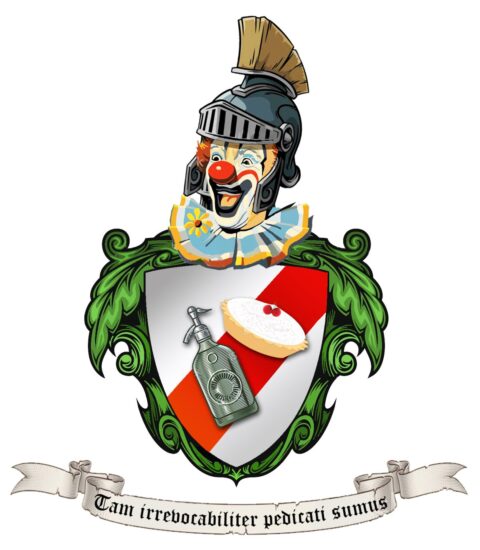At Founding Questions, Severian responds to a reader comment about educational achivement before WW2 (when the US economy was almost the last one standing among major industrialized nations, and high school graduates finally passed 50% of the population):

Proposed coat of arms for Founding Questions by “urbando”.
The Latin motto translates to “We are so irrevocably fucked”.
In the “Friday Questions” post yesterday, toastedposts asks:
I’ve been reading some more old random things (bits of philosophy and history in no particular order with no particular program.) I’m again struck by the impression that people from around 1700 to 1920 or so were noticeably smarter than people before or since. It’s something that seems obtrusive when I read the sort of things they write. Compared to the sullen stupidity and fanatacism of the communists and fellow pseudo-intellectual travellers, compared to the childish level of the propaganda with which people were manipulated post 50s and pre modern, it is striking …
I wonder why the idiocracy? Did all these supergeniuses get killed preferentially in world wars and communist enslavement afterwards? Did something about our culture change disastrously, and can it be reversed? What was in their water, and can I have some?
I’ve seen this myself. You go look at any random letter collection from the 18th or 19th century, and even their “How’s it going? The weather is nice here”-type letters are just smarter …
Or maybe not. I hate to sound like one of those “Education Theory” numbnuts here, but it’s hard to separate what you might call “native intelligence” from “rigorous schooling”. Since we’ve all been on the Internet within the last 30 years, we’ve seen that “This was a fifth grade math test in 1905” thing. Here’s an example published in The Guardian, the paper that all the very Smartest people these days read. I’ll just stick with math and history:
Arithmetic
1. Multiply 642035 by 24506
2. Subtract 3.25741 from 3.3; multiply 28.436 by 8.245; divide 0.86655 by 26.5
3. Simplify 183/4 minus 22/3 divided by 11/5 minus 31/2 multiplied by 4/7
English history
1. What kings of England began to reign in the years 871, 1135, 1216, 1377, 1422, 1509, 1625, 1685, 1727, 1830?
2. Give some account of Egbert, William II, Richard III, Robert Blake, Lord Nelson.
3. State what you know of Henry II’s quarrel with Becket, the taking of Calais by Edward III, the attempt to make Lady Jane Grey queen, the trial of the Seven bishops, the Gordon riots.
I’d have trouble with some of those. Isn’t Robert Blake an actor?
That said, those questions aren’t particularly hard. Muti-digit multiplication is more time-consuming than anything else; it’d look like a Christmas tree, spread across the page. The fact that I can’t do them now (without a refresher course) doesn’t mean I couldn’t do them then. I was taught the process; I’m just rusty. Same thing with English history. The Lady Jane Grey thing … ummm, something something Reformation? But if I’d recently taken a course on it, I’d be much more up on it.
But then again, I was able to grok the process in the first place. “Universal” education is very new, and on balance I’d have to say it’s a negative. A high school diploma was a real achievement almost within living memory. This here table says that high school graduation rates didn’t top 50% until 1940, and didn’t clear 60% until 1950. It used to be a trope in the “rags to riches” story that “So-and-So only had a fifth-grade education”, but in that world, 5th grade was plenty. Even now, 5th graders kinda sorta have the Three Rs. (Adding the fourth R, of course — that would be “Rainbow”, or maybe “rump rangering” — but still).
So the entrance exam for “King Edward’s School” — the example in the Graun article — in 1898 would be the equivalent of a very tough college entrance exam today (and note that the referenced school is very pricey and very, very elite, even now).
This is not to say that people back then weren’t smarter. They sure seem to be, and I’ve written many times that the not-elite but certainly very respectable school that awarded me a PhD in the early 21st century wouldn’t have admitted me as an undergrad as late as 1960, if not 1970. I’m just noting some context — in 1898, 5th graders were already something of an intellectual elite, and their day-to-day education reflected that.



